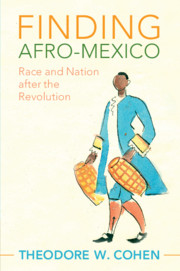
-
Select format
-
- Publisher:
- Cambridge University Press
- Publication date:
- 17 April 2020
- 07 May 2020
- ISBN:
- 9781108632430
- 9781108493017
- 9781108730310
- Dimensions:
- (228 x 152 mm)
- Weight & Pages:
- 0.63kg, 348 Pages
- Dimensions:
- (229 x 152 mm)
- Weight & Pages:
- 0.54kg, 350 Pages
- Subjects:
- Sociology of Race and Ethnicity, Area Studies, Latin American Studies, History, Latin American History
- Series:
- Afro-Latin America
You may already have access via personal or institutional login- Subjects:
- Sociology of Race and Ethnicity, Area Studies, Latin American Studies, History, Latin American History
- Series:
- Afro-Latin America
Book description
In 2015, the Mexican state counted how many of its citizens identified as Afro-Mexican for the first time since independence. Finding Afro-Mexico reveals the transnational interdisciplinary histories that led to this celebrated reformulation of Mexican national identity. It traces the Mexican, African American, and Cuban writers, poets, anthropologists, artists, composers, historians, and archaeologists who integrated Mexican history, culture, and society into the African Diaspora after the Revolution of 1910. Theodore W. Cohen persuasively shows how these intellectuals rejected the nineteenth-century racial paradigms that heralded black disappearance when they made blackness visible first in Mexican culture and then in post-revolutionary society. Drawing from more than twenty different archives across the Americas, this cultural and intellectual history of black visibility, invisibility, and community-formation questions the racial, cultural, and political dimensions of Mexican history and Afro-diasporic thought.
Awards
Co-winner, 2021 Howard F. Cline Book Prize in Mexican History, Latin American Studies Association
Honorable Mention, 2021 Best Book Award in the Social Sciences, Mexico Section, Latin American Studies Association
Reviews
'A powerful, provocative, and penetrating book, Finding Afro-Mexico embarks upon a scholarly quest to find how blackness became Mexican over the course of the twentieth century. Cohen beseeches scholars to look for different evidence, better inspect biases, and be sensitive to the multifaceted and connected power of ideologies. This book will be an eye-opener for many, and the topic of much discussion for years to come.'
Ben Vinson III - Provost, Case Western Reserve University and author of Before Mestizaje: The Frontiers of Race and Caste in Colonial Mexico
'Ted Cohen shows how Mexico’s Afro-descendant citizens survived the myth of their own disappearance. They became culturally, regionally, and socially visible during the post-revolutionary period as intellectuals and artists engaged in a transnational inquiry into the African diaspora and constructed their identities as Mexican. Supported by tenacious archival research, this book will overturn many time-worn assumptions about blackness in modern Mexico.'
Stephen E. Lewis - California State University, Chico
'Ted Cohen's long-awaited volume forces us to reconsider deeply rooted understandings of post-revolutionary Mexico and the role of race in state and nation formation more broadly. Moving seamlessly between the United States and Mexico and occasionally ranging beyond, Finding Afro-Mexico validates the promise of transnational approaches to Mexican cultural and intellectual history. An impressive achievement.'
Gil Joseph - Yale University and co-author of Mexico's Once and Future Revolution: Social Upheaval and Rule since the Late Nineteenth Century
‘In his search for Afro-Mexico, Cohen finds it hidden in plain sight - embedded in Mexican popular culture; Mexican communities, notably in the province of Veracruz where slaves first landed; and Mexico’s relationship with the US, Cuba, and the Caribbean, where the African diaspora took shape in transnational articulations. Interactions between Mexican intellectuals, activists, cultural workers, and their counterparts in the African diaspora have restored Mexico’s place in this diaspora … originally conceived and well-written … Highly recommended.’
E. Hu-DeHart Source: Choice
‘Cohen’s is not a microhistory, not an effort to detail the actual lived experiences of these communities, but an effort to detail the intellectual project of documenting Blackness in Mexico, and in that it succeeds.’
Alexander Dawson Source: H-Net Reviews
Contents
Metrics
Altmetric attention score
Full text views
Full text views help Loading metrics...
Loading metrics...
* Views captured on Cambridge Core between #date#. This data will be updated every 24 hours.
Usage data cannot currently be displayed.
Accessibility standard: Unknown
Why this information is here
This section outlines the accessibility features of this content - including support for screen readers, full keyboard navigation and high-contrast display options. This may not be relevant for you.
Accessibility Information
Accessibility compliance for the PDF of this book is currently unknown and may be updated in the future.


